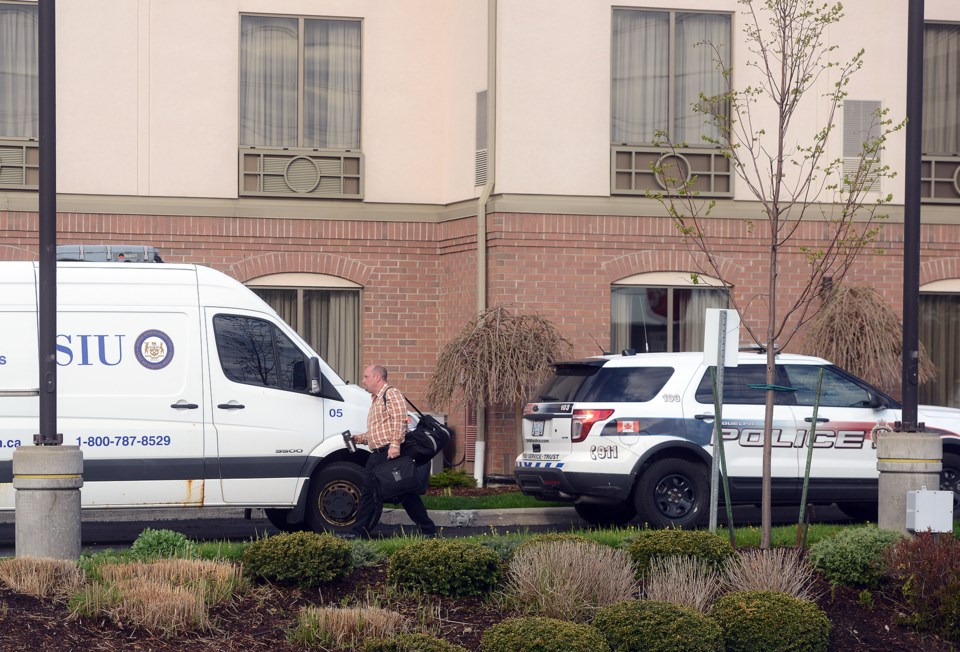NEWS RELEASE
SPECIAL INVESTIGATIONS UNIT
*************************
The Director of the Special Investigations Unit, Tony Loparco, has determined there are no reasonable grounds to lay criminal charges against a Guelph Police Service (GPS) officer in relation to the drowning death of a 25-year-old man in May of 2016 in Guelph.
Four investigators and two forensic investigators were assigned to this incident.
The SIU interviewed eight civilian witnesses and three witness officers. The notes of another five witness officers were reviewed. The subject officer participated in an SIU interview, but did not provide a copy of his duty notes, as is his legal right.
The Unit’s investigation also included the review of the post-mortem examination, toxicological report and CCTV footage.
The SIU investigation found the following:
- In the early morning hours of Tuesday, May 17, 2016, a manager on duty at the Holiday Inn Express received multiple complaints regarding the activity happening in a 3rd floor hotel room. One guest complained about a loud and persistent noise and another guest said water was seeping into his room. The manager knocked on the door, but no one answered. The manager called GPS for assistance.
- Upon arrival, three GPS officers accompanied the manager to the room. They noticed water seeping out from the doorway to the hallway, and they heard a series of loud noises coming from inside the room. One of the officers knocked on the door a number of times and announced the presence of police. The man did not respond. Officers were able to unlock the door using a master key card, but they were unable to open it more than a couple of inches because the door was latched from the inside. The officers could hear the man moving large items in an effort to barricade the door.
- GPS learned that the man had access to a knife, and that someone else might be inside the room with him. As a result, the officers on scene were directed to wait for the arrival of the Tactical Response Unit (TRU), which was commanded by the subject officer.
- The subject officer was advised that the man had barricaded himself in his hotel room, and that attempts at communication had been unsuccessful. He was further informed of the apparent destruction of property and water flowing from inside the room, as well as the possibility of the man being armed with a knife and having another person inside the room with him.
- As members of the TRU made their way to the hotel, they continuously communicated with officers at the scene and assembled the necessary tactical equipment based on the information received. Once at the hotel, members of the TRU made their way up the now flooded staircase and attended the room. They were advised that the noises from inside the room had stopped. Their attempts to make verbal contact with the man were unsuccessful. As a result of reviewing the hallway surveillance video which showed that no one else seemed to be inside the room, the subject officer authorized one of the officers to drill a four-inch hole in the door for the purpose of looking inside. Despite the room being dark, it could be seen that the room was in a state of chaos. As the bathroom light was on, it was determined that the man was likely inside the bathroom.
- The decision was made to open the door to the room and deploy a mobile reconnaissance scout to survey the room. As a result of the information gathered by the scout, the officers confirmed that the man was almost certainly in the bathroom. Officers used a battering ram to break through the bathroom door which was barricaded with various objects. They found the man lying naked in the overflowing bathtub, with his torso and head submerged.
- He was pulled out of the bathtub and resuscitation efforts were commenced, but they were to no avail.
A post-mortem examination determined the cause of death to be drowning in combination with methamphetamine use.
“It is clear that as soon as the man’s body was discovered, the members of the TRU and the paramedics on scene responded promptly and professionally. They immediately moved his body from the bathtub to an open area and commenced resuscitation efforts," said Director Loparco.
"The only issue that I need to consider is whether or not the tactics employed by the subject officer in lieu of an earlier forced entry attract criminal liability. The charge that warrants consideration in these circumstances is criminal negligence causing death, contrary to section 220 of the Criminal Code.”
Director Loparco continued, “There is no basis to impugn the actions of the subject officer concerning how he handled the situation, or how he directed the officers under his command. Each of his actions and decisions analyzed individually, as well as assessed collectively, were reasonable in the circumstances. The subject officer was initially faced with a potential hostage situation, and his actions were directed towards assessing whether someone else was inside the room and consequently in danger. Once he concluded that the man was alone in the room, the subject officer’s actions were directed towards obtaining as much information as possible—focussing specifically on the man’s location—prior to carrying out a forced entry. This was clearly done with an aim to ensuring officer safety, as well as the safety of the man.
It is clear that the man’s death was not caused by the actions of the officer, and as such, no criminal charges are warranted.”
*************************
